- Home
- Michael McDowell
Katie Page 2
Katie Read online
Page 2
Philo lived with her mother Mary Drax in a small cottage on a quarter-acre of land on the eastern boundary of New Egypt. For their dark little parlor with its tiny windows, Mary Drax could not afford a carpet for the floor nor china ornaments for the mantel. On the other side of an inconveniently narrow corridor was the kitchen, quite as small as the parlor and just as dark. Upstairs was a single chamber directly beneath the sharply pitched roof. The sloping eaves materially lessened its useable space. Here slept Mary Drax and her daughter, their beds separated by a green baize curtain.
Mary Drax was not a strong woman, neither physically nor in her character. She had performed one brave act in her life: marrying against the wishes of her family. Tom Drax, Mary’s husband and Philo’s father, had been a carefree man, who ought to have taken more care for his family. His only financial talent seemed to be a knack for getting rid of money in a way that proved to be of no benefit to anyone. After his death in the Battle of the Wilderness, Mrs. Drax had been sorely bereaved, but at the same time she found it rather easier to get along.
She sewed for a living. She was expert with a needle, and women vowed they had never known anyone to get a fuller skirt from a skimpier length of cloth. Her melancholy manner attracted women who felt sympathy for her condition and widowhood, and her meekness commended itself to those like the Varleys, who appreciated a due regard of their superior standing. But even with the principal custom of New Egypt securely hers, Mary Drax stitched but a meager livelihood for herself and Philo. A sewing machine would have assisted greatly, but where were Mary Drax and Philo to come by twenty-five dollars when they considered themselves fortunate if twenty-five cents could be found to spare in their frugal household?
Mary Drax had never taught her daughter to sew. In fact, even when Philo had expressed an eagerness to learn, her mother had dissuaded her. “There’s not enough work in New Egypt for two seamstresses,” Mary Drax said, “and I don’t want to compete with you for custom, Philo.” But her real reason was this: Mary Drax cherished an entirely groundless hope that one day she and Philo would be lifted out of their poverty. To train her daughter as a seamstress would give the lie to that sustaining hope.
Yet in the meantime, Philo needed to contribute her share. For three years she had assisted Mrs. Mark, the Methodist minister’s wife, in teaching the children of the factory workers. Philo was able and patient, and there wasn’t a child in that school who didn’t prefer her to Mrs. Mark. When the minister’s wife was confined with her sixth child, Philo took over the running of the school altogether. And when Mrs. Mark died in childbirth, Philo had reason to hope that Mrs. Mark’s place – and Mrs. Mark’s salary – would be turned over to her. But there Philo reckoned without the town’s Board of Selectmen, which was headed up by Jacob Varley. These men considered Philo too young and too inexperienced, so they hired a thin, mean-spirited graduate of the Bangor Institute not on his qualifications but on his willingness to accept even less pay than Mrs. Mark had demanded. And this bully of a man, sensing at once Philo’s superior knowledge and her recalcitrant spirit, had removed her from the school altogether.
Philo had nowhere to turn in New Egypt for work. It was true that the graniteware factory employed girls her age – and considerably younger too – but those places were reserved for daughters of men and women already working there. To assist her mother Philo would even have gone into service, but there was no household in New Egypt which both lacked daughters and possessed sufficient funds for a hired girl. Money itself was a scarce commodity in New Egypt – very little changed hands each day, and quite often bartering on a well-advanced and long-practiced scale took the place of purely monetary transactions. Philo’s only source of income now was the occasional delivery of letters from the post office to persons who lived at an inconvenient distance. For this service, which generally entailed a walk of three or four miles, she received one cent, or sometimes one cent and an armful of vegetables.
The mortgage on the cottage necessitated a quarterly payment of $22.50. This sum constituted the interest, at six percent yearly, on an original mortgage of $1,500, which had been borrowed thirteen years before by poor Tom Drax. In that time the Draxes had managed to pay back only fifty dollars of the principal, so that almost the entire amount was still owed to Jacob Varley. All Mary Drax’s exertions were wanted to make up that payment each quarter. The seamstress had unfortunately taken ill in February. Confined to her bed for seventeen days without strength in her arms to cut cloth or sharpness of vision to thread a needle, she had further been forced to make expenditures for medicines and the doctor’s visits. Her fragile scheme of employment and saving had been upset, and Mary Drax was six dollars and fifty cents short.
It was nearly dark when Philo returned home. A single candle burned in the parlor, and by its meager, guttering light Mary Drax was straining her eyes to finish off the collar of a boy’s shirt.
“Mother,” said Philo, “I have delivered all the bundles. I am sorry if I am late, but Jewel Varley stopped me in the road and would talk.” Philo seated herself in the little chair across from her mother’s in the western parlor window.
“Always be pleasant to Jewel, dear,” said her mother. “Jewel’s father owns this house, and Jewel and Mrs. Varley keep me constantly involved on their wardrobes.”
Philo bit her lip and beat a tattoo on the sill of the window.
“Jewel is a disagreeable companion,” said Philo. “She taunts me because I am poor and have no expectations.”
“We are poor,” sighed Mrs. Drax, “and Philo dear, you have no expectations at all. It is hard, but—”
“I don’t mind what Jewel says about me, Mother. I have known Jewel too long, and her tongue doesn’t get sharp on me. But she told something that does bear upon us, I’m afraid.”
Mrs. Drax put down her work and closed her eyes. They were red and watered and pained her. “What did she say?”
“She said that there was a new dressmaker in town, and that she and Mrs. Varley intended to employ her.”
The shirt slipped from off Mrs. Drax’s lap and onto the floor. “Philo, this is a very great misfortune! Mrs. Varley and Jewel have been my mainstays. I don’t know now what we shall do, for I haven’t even the money to pay Mr. Varley when he comes tomorrow.”
This was unexpected and unhappy news for Philo, but she attended to her mother’s distress before giving in to her own. “Something will turn up, Mother. We shall get the money somehow. I only wish it were the summer, for then I could pick berries and sell them.”
“We shall be turned out!”
“No, Mother! Of course not. Even if we are a little late with the mortgage payment, Mr. Varley is hardly likely to evict us.”
“He is very hard with his other tenants, I have heard. The week before Christmas he turned out one of his workers, and that man had five children. It killed his wife. She died in the street of a broken heart. We will be sent to the poorhouse!” Mrs. Drax cried out, the dreadful possibility occurring to her suddenly. “Oh, I know it!” she wailed the next moment in wretched certainty.
Philo looked sternly at Mary Drax. “We will not,” she said defiantly. “Mother, take hold of yourself. I’ll get the money somehow.”
Mrs. Drax shook her head, unconvinced by her daughter’s optimism. It was impossible to imagine that Philo, who had never possessed more than fifty cents at any one time in her whole life, could produce that and six dollars besides before the next day was out.
Mrs. Drax’s spirits did not improve over the course of their small supper, though Philo, repenting her earlier harshness with her mother, formulated a hundred small schemes for the getting of six dollars and fifty cents, some of them remotely promising, some very unlikely, some humorously preposterous – such as that they should borrow a little press from the stationer in Trenton and simply print out the needed bills (and some few more as well, as long as they were at it); or that they should sell shares in a coal-mining ventu
re in earnest of which Philo was prepared to dig a tunnel from the root cellar all the way over to the Presbyterian Church; or that Philo should paint her face with lampblack, climb into a yellow pinafore, and allow herself to be exhibited as the “Monstrous African Baby – Six Months Old and Weighing One Hundred Eight Pounds Nine Ounces Avoirdupois.”
It was when she had finished washing up the dishes that Philo turned to her mother with an expression of surprise. “Oh, Mother, I quite forgot. We have received a letter! I was walking past the post office, and Mr. Clegg ran out waving this—” She dried her hands, and from the pocket of her skirt she drew out a small but thick envelope.
“Who on earth – ?” wondered Mrs. Drax. “Where was it mailed?”
Philo examined the postal mark. “It was mailed at Shiloh on the day before yesterday. Mother, you were born in Shiloh. Perhaps it is an old friend who has written to you.”
Mary Drax took the letter and looked at the writing upon the envelope. She trembled. The letter dropped from her grasp to the floor. “Philo,” she whispered, “the letter is from my father!”
Chapter 3
THE INTEREST PAYMENT
Philo plucked the letter from the floor, and her mother begged her to open it. “I cannot, Philo, I cannot,” she whispered. “I have not heard from your grandfather for twenty-three years – not since the day that I married Poor Tom.” Mary Drax never referred to her husband without the deprecatory adjective, and it was very much in this character that she remembered him.
But just as Philo had taken up a knife to open the envelope, the two women were surprised by a knock at the door. Mary Drax laid a startled hand on her heart, in alarm that was more a result of the letter than of the unexpected summons.
Philo slipped the letter back into her pocket, lighted a small candle in a stand, and after seeing her mother seated anxiously in the parlor, opened the door of the house.
“Mr. Varley!” said Philo in surprise.
“Mr. Varley!” echoed her mother in a voice of terror, and rose precipitously.
“Good evening, Philo,” said Jewel’s father gravely. He was a tall, imposing man of middle age whose every word and gesture seemed calculated to impart a sense of his own consequence. When his eyes moved they appeared to be searching out whether those around him were granting him the respect due his sublime station in New Egypt. He wore four large rings, and a thief of small stature might have been hanged from his watch chain.
“Please step in, Mr. Varley,” said Mrs. Drax deferentially, and raised a trembling hand to point out her best chair. He appeared entirely too large for the small chamber, like an owl imprisoned in a cage meant for a canary.
Philo for the first time saw the man who had stood behind – and had in fact been almost hidden by – Mr. Varley. The flame of the candle was reflected in his eyes – and they were eyes that seemed to smile. He was tall and well-proportioned, with rather shorter hair than was worn in the country and a fine brown beard with large moustachios. “Good evening, Miss Philo,” he said pleasantly. “I am Henry Maitland.”
It is probable that had Mr. Maitland remained silent, Mr. Varley would not have introduced him, thinking the Draxes beneath his important nephew’s notice. For despite his ease of manner and unfailing politeness, Henry Maitland had a fortune that was at least ten times that of Mr. Varley, and Mr. Varley, who was by no means a poor man, knew it.
“I am pleased to meet you, sir,” said Philo with a smile. But that smile faded when she remembered that a few hours earlier she had seen him walking with Jewel in the Varleys’ garden – and that Mrs. Varley intended that Jewel should marry this very man.
“Please sit down, Mr. Maitland,” said Mary Drax. “May Philo bring you two gentlemen a glass of water?”
“No, thank you,” said Jacob Varley shortly. “We have no intention of remaining so long. Mr. Maitland merely requested an evening’s walk after dinner, and as I saw your lighted window, I thought I might as well stop and collect the money that is owed this quarter.”
“The payment is not due until tomorrow,” said Philo.
Jacob Varley paused a moment before answering, and when he did speak he addressed Philo’s mother. “Mrs. Drax, I am a busy man. Do you mean to make me walk over here again tomorrow morning?”
“I don’t have all the money tonight,” said Mrs. Drax in a small voice.
Philo glanced at Mr. Maitland. He sat a little apart and behind Mr. Varley and, with a movement that was probably habitual for him, ran his fingers along his moustachios, smoothly turning his head as he did so. But his evident study was Mrs. Drax and herself.
In an aggrieved tone, Mr. Varley said to Mrs. Drax as he rose from the chair, “Then I must return tomorrow, I suppose. I shall be here at about eleven o’clock, before that—”
“I won’t have all the money then either,” protested Mrs. Drax. “In February, you’ll remember, Mr. Varley, I was quite ill, I—”
“What do you mean, you won’t have the money?”
“We have the largest portion of the payment, sir,” said Philo. “So we must ask you to allow us another week to make up the remainder. Mother and I—”
“I will do no such thing!” cried Mr. Varley, incensed. “Don’t approach me with such a scheme. I want to know nothing about illness and partial payments and the like! If you cannot meet the interest on the loan, then you are welcome to go elsewhere. Only today I had an enquiry regarding the availability of this house from one of my senior employees. I know his wages, and I am certain he would not attempt to cheat me of what is rightfully mine!”
“Cheat!” cried Philo incensed.
“Uncle Varley,” said Mr. Maitland, speaking for the first time, “I am certain that these two ladies would have no intention of depriving you of your . . .” He paused. “. . . legal deserving.”
Mr. Varley grunted, perhaps realizing that he had spoken too harshly in the presence of his nephew. Grandly, he said, “I will return at eleven o’clock tomorrow and will be grateful to receive your quarterly payment then.”
“And if not?” asked Philo boldly.
“Philo, do you set up to speak for your mother?”
“My mother is distressed, Mr. Varley.”
“She will have my money for me tomorrow, or she shall be more distressed yet.”
“You would turn us out?” demanded Philo, forgetful what effect such a question would produce in her mother.
“Come Mr. Maitland, let us continue our stroll,” said Jacob Varley, turning to his nephew.
“Uncle Varley,” said Mr. Maitland easily – quite as if there were not a destitute widow openly sobbing in the room – “I am thirsty. I will remain a few moments and then meet you again at your house.”
“As you desire,” replied Jacob Varley, and majestically departed.
Philo looked grimly at Henry Maitland. His insensitivity to their plight seemed extreme. Philo knew only one rich man – the one who had just walked out of the house – and had always nurtured a hope that he was a prejudicial example of the species. Yet here was just such another. Despite their evident distress, there seemed to be a smile on Henry Maitland’s lips. “May I get you that glass of water, sir?” said Philo in rather a harsh voice.
Mr. Maitland nodded his head. And there was a smile behind his moustachios.
Philo went to the kitchen. Mary Drax, recalling her manners despite all her troubles, asked, “You are Mr. Varley’s nephew, I believe?”
“Yes. My mother is Mr. Varley’s elder sister. Mother and I live in New York, and besides one another, the Varleys are all we have to denominate family.”
“And how do you occupy your time in New York, Mr. Maitland? Are you in commerce?”
Philo brought a glass of water, which the young man accepted with a word of thanks. “I have no business,” he said. “I am entirely idle, I fear. My father left my mother and me well provided for – perhaps a little too well provided for, at least so far as the development of my character is co
ncerned.”
“Perhaps you could devote yourself to charitable concerns,” suggested Mary Drax.
Philo blushed hotly, thinking of their financial plight. It might seem to Mr. Maitland that Mary Drax was surreptitiously asking for help. “Mother,” Philo whispered.
Mr. Maitland glanced at Philo, but remained impassive. She suspected he understood her discomfort.
Presently, he said, “I am afraid I am a wholly unregenerate case, Mrs. Drax. I haven’t the stamina for any sort of cause or project. I go where the wind blows me. A few weeks ago I realized that I was weary of being alone, and weary of crowds, and weary of the city, and weary of just about anything I heard or saw or did, and so decided to take a little trip into the country. I happened to meet Mr. Varley on the street in New York and he invited me down. And here am I, installed and introduced about as ‘nephew.’ ”
He smiled, and in this speech and in that smile, Philo realized how great a world there was beyond the reaches of New Egypt, that it could hold – without her having ever heard of them at all – rich young men, world-weary young men, lonely young men, men who travelled distances on so small a pretext as a chance meeting on the street and a vague dissatisfaction with the tenor of their lives. New Egypt had been Philo’s entire world for eighteen years, but to this handsome, bearded man, it was a spot of ink on a map, distinguished only by its containing his mother’s younger brother.

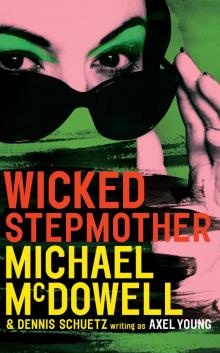 Wicked Stepmother
Wicked Stepmother Blackwater: The Complete Caskey Family Saga
Blackwater: The Complete Caskey Family Saga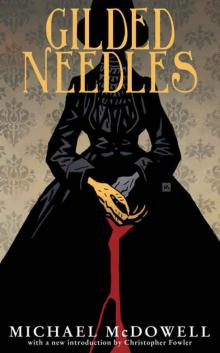 Gilded Needles (Valancourt 20th Century Classics)
Gilded Needles (Valancourt 20th Century Classics)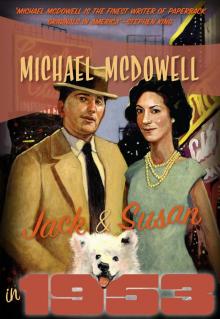 Jack and Susan in 1953
Jack and Susan in 1953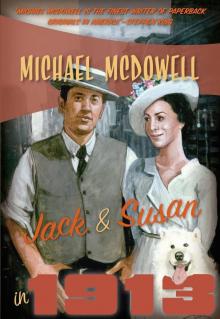 Jack and Susan in 1913
Jack and Susan in 1913 Rain
Rain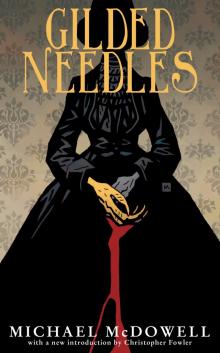 Gilded Needles
Gilded Needles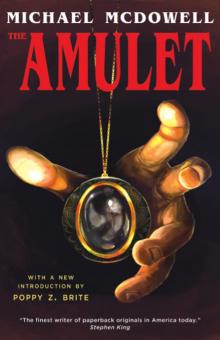 The Amulet
The Amulet Cold moon over Babylon
Cold moon over Babylon The Elementals
The Elementals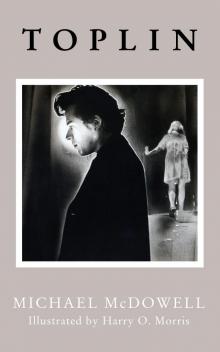 Toplin
Toplin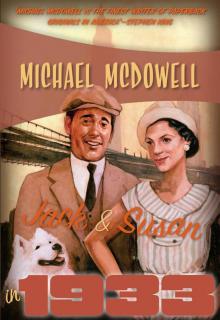 Jack and Susan in 1933
Jack and Susan in 1933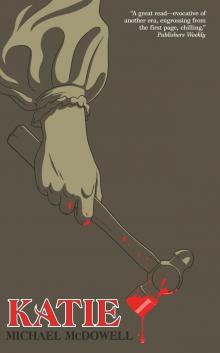 Katie
Katie The Valancourt Book of Horror Stories
The Valancourt Book of Horror Stories